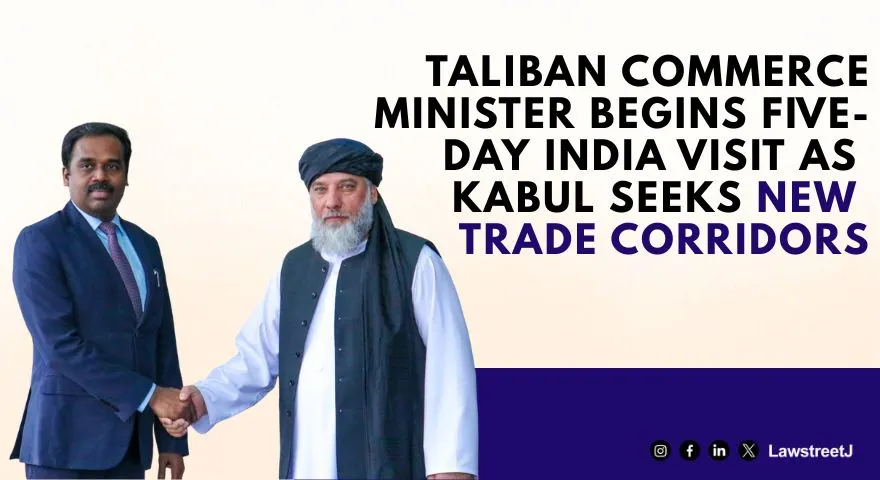New Delhi: Afghanistan’s Taliban-led administration has sent its Commerce and Industry Minister, Alhaj Nooruddin Azizi, to New Delhi for a five-day visit focused on trade expansion, investment opportunities, and alternative sea-route connectivity. The trip comes at a time when Afghanistan’s relationship with Pakistan remains tense, prompting Kabul to look more seriously toward India and Iran for reliable commercial access.
Shift Toward India and Iran Amid Pakistan Transit Disruptions
Azizi arrived in New Delhi on November 19, 2025, accompanied by a senior business delegation. This is the second high-level engagement between India and the Taliban administration within a short span, following the October visit of Taliban Foreign Minister Amir Khan Muttaqi.
The visit comes after a difficult month for Afghanistan’s trade movement. In October, Pakistan temporarily blocked transit routes for Afghan goods, citing security-related concerns at several border points. Although Islamabad later permitted partial movement, the interruption pushed Afghan officials to accelerate discussions with India and Iran for dependable trade pathways. Afghanistan has reiterated its interest in increasing the use of Iran’s Chabahar Port and has proposed establishing an air-cargo link between Kabul and New Delhi.
India reopened its embassy in Kabul in late 2025, restoring a limited diplomatic presence after shutting it down in 2021. Since reopening, discussions on trade have resumed. India is exploring imports of Afghan fruits, dry goods, and certain minerals. Current bilateral trade is valued at roughly USD 900 million, and Afghan authorities say they aim to raise the figure to USD 2–3 billion in the near future.
During the visit, Azizi is scheduled to meet India’s External Affairs Minister and Commerce Minister, along with representatives of Indian industry bodies. According to the Afghan Ministry of Industry and Commerce, the agenda includes efforts to expand cooperation, streamline trade procedures, set up joint investment platforms, and examine the legal frameworks required for long-term economic engagement.
Afghanistan is particularly focused on attracting Indian participation in its mining sector. The country holds deposits of lithium, copper, rare earth elements, and other minerals that could be commercially significant. Any such engagement, however, must navigate Afghanistan’s regulatory system under Taliban rule. Although the administration is not formally recognized by most governments, it continues to negotiate economic matters through bilateral channels.
Afghan authorities are also seeking partnerships for hydroelectric projects in various provinces. These would require technical expertise, project agreements, and investment safeguards. Any Indian involvement would be subject to legal scrutiny under India’s investment rules and international obligations, especially when dealing with administrations lacking formal diplomatic recognition.
Trade facilitation issues—such as banking systems, customs paperwork, and transport documentation—are also expected to be part of the discussions. Afghan officials have stated on record that creating stable legal structures for trade and investment remains a priority.
Geopolitical Context and the Question of Connectivity
Azizi’s visit is taking place amid broader regional shifts. With Pakistan’s transit unpredictability affecting Afghanistan’s access to markets, Kabul is attempting to strengthen connections that bypass Pakistani routes. India’s long-standing interest in using Iran’s Chabahar Port to reach Central Asia aligns with Kabul’s push for alternative corridors.
India, in recent statements, has reiterated that its engagement with Afghanistan focuses on humanitarian support and economic cooperation. India has not recognized the Taliban administration, and all official interactions follow established diplomatic protocols. Legal experts note that any engagement must comply with United Nations Security Council resolutions and domestic regulations governing dealings with non-recognized regimes. Any decisions emerging from the meetings would likely be provisional and contingent upon further review.
Despite these limitations, both sides continue to express interest in expanding trade. Afghanistan is pushing for predictable routes and consistent market access, while India remains open to exploring commercial possibilities that support regional stability.









